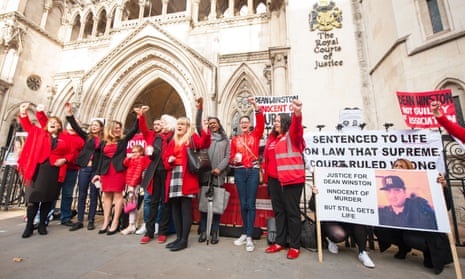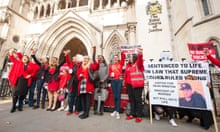Joint enterprise prosecutions in England and Wales are to be monitored after a legal challenge from campaigners who argued it disproportionately targets black males and young men.
Under the doctrine, an individual can be jointly charged with the crime of another if the court decides they foresaw that the other party was likely to commit that crime and intended to encourage or assist them. This has resulted in bystanders, or people involved in much lesser criminal offences, being convicted of murder or manslaughter.
Studies indicate that joint enterprise prosecutions are more likely to target young men and black boys, particularly in so-called gang-related cases – with whole groups often convicted for a crime committed by one person on the back of allegations that they are in a gang.
A 2014 study by the Institute of Criminology at the University of Cambridge found that, of young male prisoners serving 15 years or more for joint enterprise convictions, 38.5% were white and 57.4% BAME, including 37.7% black.
In 2016, the Centre for Crime and Justice Studies found that joint enterprise prisoners who identify as BAME were significantly younger than their white counterparts and were serving longer sentences on average.
The Crown Prosecution Service’s pilot scheme will record data on the age, race, sex and disability of those prosecuted under the joint enterprise doctrine.
In 2012, parliament’s justice select committee recommended that the CPS should start recording and monitoring data about joint enterprise prosecutions, but it was only after the human rights organisation Liberty took legal action against the CPS on behalf of the campaign group Jengba (Joint Enterprise Not Guilty By Association) that it has agreed to do so.
Liberty and Jengba alleged that by not recording and monitoring joint enterprise data, the CPS was breaching its duties under the Equality Act 2010 to have due regard to eliminating race discrimination.
The joint enterprise doctrine has always been controversial. In 2016, the supreme court ruled that the doctrine had taken a “wrong turn” and been misinterpreted for 30 years.
It said courts had been in “error” in treating the fact that a secondary, co-accused had foresight that the principal attacker might carry out a killing as sufficient proof of guilt in assisting or encouraging them. The supreme court declared that a person will be guilty of a joint enterprise offence only if they intended to encourage or assist the person who committed the offence to do it.
That landmark judgment was expected to lead to a reduction in joint enterprise prosecutions and convictions, but a 2022 report by the Centre for Crime and Justice Studies (CCJS) showed that it has had no discernible effect, while the number of black people convicted of murder under joint enterprise has risen.
after newsletter promotion
Jengba believes that the monitoring of joint enterprise convictions will show that the doctrine is discriminatory, and disproportionately affects young men and black boys.
Gloria Morrison and Jan Cunliffe, cofounders of the group, said: “Joint enterprise prosecutions are racist, deliberately targeting marginalised communities by collectively punishing them. Today’s win is just the first win in a huge battle to create a justice system that we can all trust.”
Lana Adamou, a lawyer at Liberty, said: “This is not the end of the battle, but being able to see plainly the extent of any discrimination in who is targeted under the joint enterprise doctrine is a crucial step forward in ending its use.”
A CPS spokesperson said: “The agreement to introduce the pilot is in response to the specific points raised in the action by Liberty/Jengba, focusing on homicide cases where joint enterprise is alleged. The CPS remains committed to its wider work on disproportionality.”








